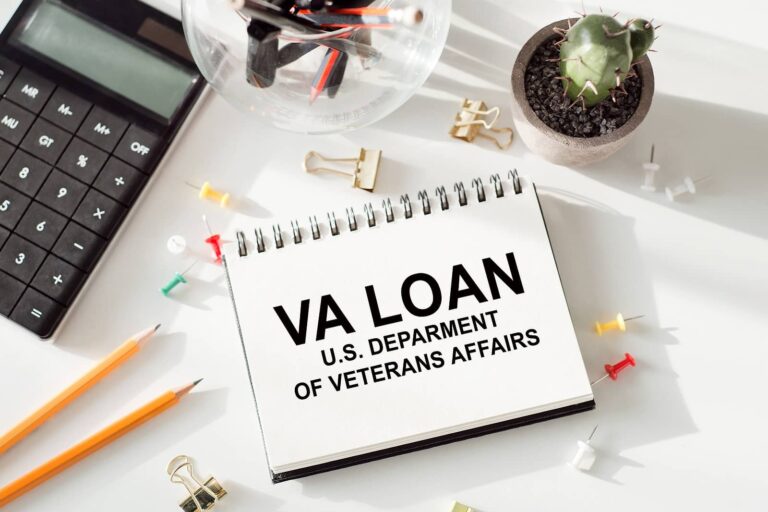Did you know that active-duty military members and veterans are well-positioned to build lucrative real estate investments? It’s true! Many military homebuying benefits exist to make homeownership affordable for service members. Keep reading to uncover real estate investing tips that will help active-duty personnel and veterans understand how to build wealth with the VA loan and other military benefits.
Invest in Your Own Home Using the VA Loan

Using a VA loan offers many benefits when buying a home
Almost all first-time real estate investors get their start by purchasing a primary residence.
Does your primary residence count as an investment?
Absolutely! For many people, buying a home is the most valuable investment they ever make. While a primary residence doesn’t offer passive income, it pays off in other ways.
The first and most obvious way is to build equity.
Related: What You Need to Know About Real Estate Equity
Over time, as you make mortgage payments and your home increases in value, you’ll build up a nest egg of equity that can be tapped into later in life. Renting while in the military is tempting, but remember that you’re paying someone else’s mortgage – not building equity in your own home.
The Department of Veteran affairs makes it easier for veterans to buy homes by providing them the VA Loan.
The VA Loan is a government-backed loan program that helps active-duty veterans and their families finance the purchase of a home. Introduced in 1944, the loan paves an affordable path to homeownership with no down payments, no private mortgage insurance, and lower interest rates compared to conventional mortgages. While the loan was designed for veterans, active-duty members are still eligible in most cases as long as they’ve served for 181 days (or 90 days during an active war.)
While VA loans have many advantages, they also come with several stipulations that make real estate investing more complicated.
Military Appraisals Ensure the Home Is Safe, Sound, and Sanitary
Everyone needs a home appraisal, but VA borrowers must follow special protocol. All homes purchased with a VA loan must first pass a unique military appraisal to ensure compliance with the military Minimum Property Requirements (MPR).
The MPR is a long list of criteria that every home must meet to be approved for a VA loan. The criteria can be broken into three categories:
For example, the home must have a working kitchen and bathroom; it can’t have any major structural defects; and it must be free of any health and safety hazards. This protocol is in place to certify the home’s value and does not replace a traditional inspection.
This poses an obstacle for military investors because it rules out many fix and flip properties.
Occupancy Requirements Delay Rental Income
Occupancy requirements present another challenge veterans face when buying investment properties with a VA loan. The borrower must move into the property within about two months of closing and must maintain full-time residency there for at least a year. After a year, they can move out of the house and operate it as an income-producing rental.
However, a Permanent Change of Stations (PCS) will allow VA buyers to rent out their homes without one year of occupancy. While it’s never ideal to move unexpectedly, a PCS provide military investors the opportunity to operate their former home as a rental and buy a new home using a VA loan.
Use BAH as Income on a Mortgage Application
Basic Housing Allowance (BAH) is another huge perk for military home buyers. BAH is a monthly stipend, based on location and pay grade, that helps offset the cost of housing.
Eligible service members can use this allowance to help qualify for a mortgage by counting it as income on a loan application. This is especially beneficial for those who are married or have dependents, as a spouse and children increase the BAH allowance.
For example, a staff sergeant with dependents stationed in San Diego would receive $3,249 per month in BAH. Additionally, they’d receive anywhere between $2,800 and $4,400 per month as their salary. Therefore they could potentially list their salary anywhere from $6,049 and $7,649.
As a general rule of thumb, buyers should set their monthly mortgage budget to be about 36% of their monthly income before taxes. In the highest-earning example above, the borrower could reasonably afford a mortgage with monthly payments of up to $2,754.
It’s important to note that BAH only applies to active-duty military members only. After completing their service, veterans no longer receive a housing allowance, but they can qualify for additional housing grants that will help them fund a down payment.
Use the VA Loan to Purchase a Multi-Unit Home
One of the best real estate investing strategies for military members is to use their VA loan to purchase multi-family real estate.
This could be a duplex, triplex, or fourplex where the borrower occupies one unit and rents out the others. Any building larger than four units is considered commercial real estate and will not be eligible for VA loan investors.
The VA loan can’t be used for investment properties. However, as long as the borrower occupies one unit of the building for 12 months, the property won’t be considered an investment in spite of generating income via rent. The rental income can then be used to help offset the mortgage payments and build wealth over time.
When it comes to investments, multi-family homes are better than condos because they don’t have to be included on approved VA lists.
While collecting rent is generally considered passive income, it’s worth noting that the process still requires work. Being a landlord comes with a number of responsibilities, from finding and screening tenants to maintaining the property.
Related: 8 Steps to Becoming a Landlord
Purchase Two Homes With a VA Loan
VA loans can be used to buy two homes at once, which is beneficial for military members who can be flexible with their accommodations and savvy with their knowledge of VA loan entitlements.
VA loan entitlement refers to the amount of the loan that is insured by the Department of Veteran Affairs. The VA guarantees 25% of the loan or up to $161,800, whichever comes first.
Therefore, a veteran can borrow up to $647,200 without providing a down payment. If the home costs less than this amount, they can use the remaining entitlement for another VA-backed home loan.
When planning to take out an additional VA loan with leftover entitlement, it’s important to buy a less expensive property first.
Here’s why: imagine a military member wants to buy a primary home and a rental investment using VA loans. Occupancy requirements dictate that the borrower must live in the home for at least a year before renting it out.
Therefore, the borrower could buy a property for $272,300. That means their remaining entitlement would be $144,781.25. After one year, they could start renting out the first property and can use the rollover entitlement to purchase a home that costs up to $579,125 without a down payment.
Related: How to Buy Multiple Rental Properties in a Single Year
Use Military Homebuying Perks to Jump-Start Your Real Estate Goals
When it comes down to it, military members don’t follow a different investing path than everyone else. However, they enjoy access to the VA loan, BAH, and government-backed assistance programs that provide huge advantages and can expedite their experience as an investor.
If you’re an active-duty military member or a veteran, evaluate your real estate goals before making your first purchase. Whether you want to own a primary residence to use for the unforeseeable future or you want to grow a portfolio of rental properties, military homebuying perks will set you off on the right path. From there, your real estate journey can be whatever you want it to be.
Relying on the VA Loan isn’t a sustainable practice for long-term investing. Instead, use these VA advantages to get started with investing. Reinvest your gains to snowball your portfolio. If you follow these real estate investing tips, you will soon be on the path to making additional income from rental properties.
This guest post has been contributed by Sallie McBrien.

